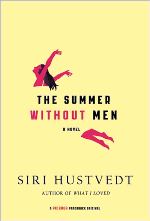Siri Hustvedt is the internationally bestselling author of WHAT I LOVED and THE SUMMER WITHOUT MEN. Below, she reflects on the influence of her mother, Esther Vegan Hustvedt --- and how the bond between mother and child affects all of us.

I suspect that the sentimentality surrounding mothers and Mother’s Day, a sentimentality we inherited chiefly from the 19th century, is a form of disguise, a way to mask maternal power with rosebuds and ribbons, to make it appear both unthreatening and disembodied. The word influence has a Latin root, fluere, to flow, but its beginnings are astrological. According to WEBSTER’S DICTIONARY, it referred to “an ethereal fluid held to flow from the stars and to affect the actions of humans.” Mothers may not be heavenly bodies, but their influence is enormous, and we become ourselves through them. Through early interactions, our first dialogues, or what infant researchers call attunement between mother and child, our brains develop. Our emotional responses become ingrained patterns. Our relations with our mothers affect the autonomic, neurochemical and hormonal functions of our growing brains. But we don’t remember any of it. That influence is lost to conscious memory. It is not lost to bodily or implicit memory, however. It lasts. But what does this have to do with literature, with writing books, with language?
In my experience, fiction is not produced consciously. It is true that I am keenly aware of my sentences. I pick at verbs, revise clauses, worry about punctuation, but this is not the essence of a writer’s work at all. The essence is emotional --- a need to offer a story to someone else --- an imaginary other person. Where do the stories come from? How does a writer know when a story is right? She knows because it feels right, and that feeling is not some intellectual evaluation of the sentences in front of her, but a profound sense that this character or this particular turn in a novel has to be as it is. It could be no other way. And it must resonate inside the writer as an emotional, not a literal, truth. I’ve found it now. This is right. That feeling of rightness is hugely complex, but I am certain its origins are old. They begin in the relations between the two members of that unequal couple --- mother and child --- and then are developed and refined and altered over a life history as more players walk onto life’s stage.
My mother, Ester Vegan Hustvedt, is 88 years old, and she is still reading and thinking about books. She belongs to two book clubs and a play-reading group in my hometown, Northfield, Minnesota, where she continues to live. Although the first 30 years of her life were spent in Norway, she has a passion for literature in English. When I was 11, my mother gave me two small books of selected poems --- one by William Blake and another by Emily Dickinson. I read the books over and over again, like a girl possessed. In my own mind, those two volumes became the mythical beginning of my life as a scribbler.
I realize now that the poems were also signs of my relation to my mother. I didn’t understand all those mystifying lyrics. I loved their sounds, their music, the feelings they gave me. But I also think I read them as secret communications between my mother and me. The poems were marked by my mother’s influence, an influence that by then had become an ethereal quality hard to articulate, but one which was resonant with the profound connection between us.


